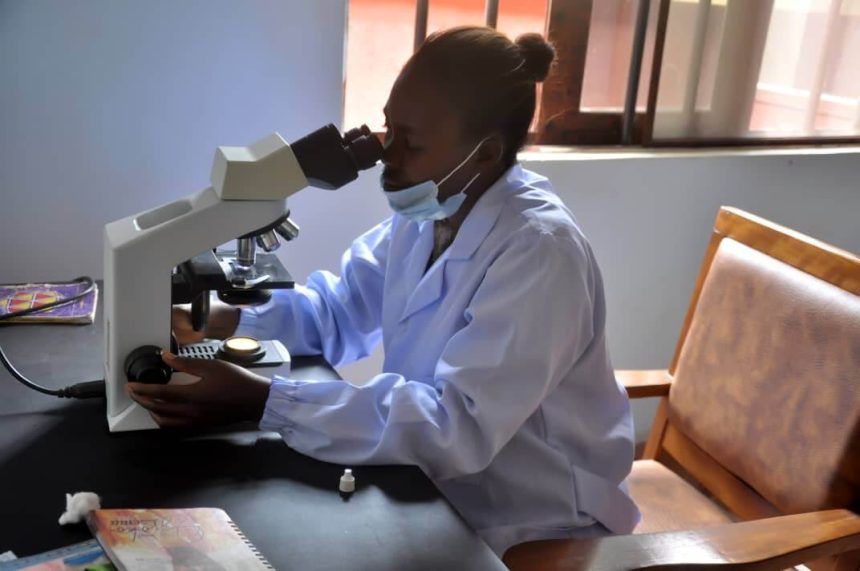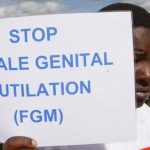NSUKKA, ENUGU: Until December 2019, whenever Emmanuel Eze took ill, he had to take a 30-minute bus ride from Ozalla Edem-Ani village to Nsukka, a town in Nigeria’s southeastern state of Enugu, to seek care.
“[I] visit a doctor [in Nsukka] for proper treatment because what we have in my place is just a [primary] health center with poor facilities,” Eze said.
After he was diagnosed with diabetes in June 2019, Eze visited his doctor in Nsukka at least once a month because it became necessary to help manage his sugar and cholesterol levels and blood pressure.
As a former civil servant who started receiving a meager sum as a monthly pension after retiring in 2010 as a chief security officer at the Enugu State University of Science and Technology, the regular visits to Nsukka were not only stressing him out physically but financially too. Each visit cost him as much as N12,000 (about $30), which he said is nearly half his monthly pension.
In July 2019, his health became so bad that he was admitted to the hospital for treatment for 19 days; he said he spent N87,000 (about $229 then) during this period.
“Thank God for my small savings, but I still had to borrow from friends [to pay the bill],” the 75-year-old retiree said, adding that those he borrowed from later wrote off the debt.
However, these days, Eze no longer worries about paying monthly medical bills. He also does not need to travel to Nsukka, thanks to a nonprofit that built and equipped a medical health center that offers free medical health services in his village, Ozalla Edem-Ani.
Eze is among over 2,000 villagers – including 460 children and 1,132 pregnant women – who have benefitted from free healthcare services offered by the hospital built by Ogadagidi Global Empowerment Initiative, a nonprofit that gives health, educational, and livelihood support to poor groups in Enugu State.
Called Ubogidi/Ozalla Community Hospital, it is a 20-bed cottage hospital, including six for children. However, most of its services are to outpatients – patients who visit the hospital for treatment without staying overnight – through its outpatient compartment.
With 16 staff, including three doctors, the hospital offers free minor surgeries, x-ray services, antenatal care, laboratory tests, consultations, and drugs.
For complicated health conditions that its staff cannot handle, the hospital refers patients to other health facilities equipped to handle such cases in Enugu.
Its founder, Ikechukwu Samuel Asadu, who started the nonprofit in 2018, said he was inspired to build the health facility after noticing that healthcare access was a challenge for many poor people in his village, which is the same as Eze’s.
The entrepreneur, who also has been a practicing nurse in Texas, US, for over 24 years, started giving healthcare support by paying medical bills for a few villagers back home. Later, he felt that it was better to build a facility that could help much more people.
Though he started the project with his personal funds, the hospital is partly sustained by Nigerians’ donations, including those living abroad.
“Some persons, mostly Nigerians in the US, have donated [money], and some donate drugs,” the 55-year-old said. A pool of volunteer directors manages the hospital.
Public health in Nigeria is grouped into primary, secondary, and tertiary. While tertiary health services are left in the hands of the federal government, state governments are responsible for secondary health provisions, while local governments, with support and supervision from the state governments, handle primary healthcare – which is closer to the people in rural settlements and makes up over 85% of health care facilities in Nigeria.
Overall, public healthcare is highly underfunded here. Underfunding has continued to make it nearly impossible to achieve good national health outcomes because insufficient funding translates to inadequate and poorly equipped public healthcare facilities, resulting in large out-of-pocket payments to private health facilities.
Launched in 2005, the National Health Insurance Scheme has reached only 5% of the population, which explains why out-of-pocket expenditure is around 70%.
For example, by 2010, 10 years after all African countries agreed to allocate at least 15 percent of their annual budget to healthcare, Nigeria was among 27 countries a World Health Organisation review tagged as making “insufficient progress.” That was because the country never met that target within the said period, despite being rich in mineral resources and being Africa’s number one oil exporter. No thanks to decades of high levels of corruption and mismanagement of public funds.
Another 10 years after that unfavourable review, Nigeria’s annual health budget has continued to decline, dropping from 5.97% in 2012 to 4.5% in 2020.
That low 2020 healthcare budget amounted to just N2,000 (or $5) per head, way below the per-citizen budget of African countries like Uganda at $12 and South Africa at $525, and way removed from those of developed countries like the US at $11,072, Switzerland at $8,000 and Germany at $6,600.
Underfunding further translates to a poor work environment and conditions that continue to push thousands of Nigerian healthcare professionals to move abroad in search of better working conditions. A 2017 survey shows that many doctors are willing to leave with the slightest opportunity.
Left with inadequate and poorly equipped health facilities, rural settlers feel the biggest impact of health failure.
“There are several reasons that limit access to proper treatment in rural areas. One is a source of healthcare finances,” said Okanyi Paul, consultant family physician at the University of Nigeria Teaching Hospital or UNTH in Enugu. “Generally, healthcare is not cheap. For rural dwellers, paying for hospital bills is difficult, so they choose local herbs”.
The only primary health center in Eze’s village, whose primary functions are supposed to include prevention and treatment of disease and rehabilitation of patients, has been reduced to just helping pregnant women deliver due to lack of facilities.
“There’s a difference between a standard hospital and a [primary] health center,” Eze said. “What they mostly do in our [primary] health center, which was built nine years ago, is mainly to assist pregnant women to give birth and not to do surgery and operation or offer services such as x-ray.”
The healthcare initiative of Ogadagidi Global Empowerment Initiative is therefore filling a considerable gap in Eze’s village. If there are many such supported initiatives, they can go a long way in helping poor and vulnerable groups with limited or no access to healthcare.
However, Asadu said his nonprofit is facing financial challenges, and to keep the hospital running, he is now calling on willing and able groups and individuals to support the effort.
“I am calling on anyone to help,” he said.
Meanwhile, Eze is feeling relatively better now. “[My sugar level has come down to normal since I started enjoying the [free services at the] hospital, but the doctors say I should continue with my check-up at the hospital every two weeks,” he said.
This article was first published on progressclock.com before we migrated to primeprogressng.com





